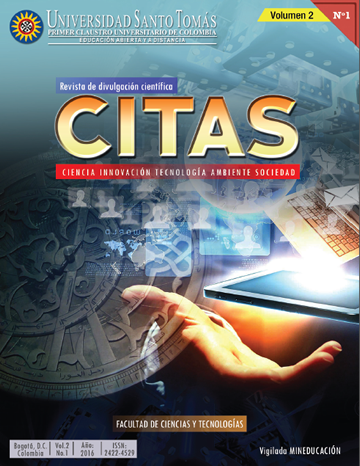Editorial
Abstract (en)
In the document "Guidelines for the Design and Curriculum Update USTA-Colombia", from the Santo Tomás University, the nature of academic spaces is discussed, both in the theoretical and practical fields. The practical spaces are aimed at both the teacher and the student developing procedural, experimental, research, verification or recognition of natural phenomena, reflection on doing (praxis) and the empirical verification of laws and scientific phenomena following pre-structured protocols. To demonstrate these practices, the space of academic journals becomes an ideal means of dissemination.
Abstract (es)
En el documento “Lineamientos para el Diseño y la Actualización Curricular USTA-Colombia”, de la Universidad Santo Tomás, se habla de la naturaleza de los espacios académicos, tanto en el ámbito teórico como práctico. Los espacios prácticos están orientados a que tanto el docente como el estudiante desarrollen trabajos procedimentales, experimentales, de investigación, verificación o reconocimiento de fenómenos de la naturaleza, la reflexión en torno al hacer (praxis) y la comprobación empírica de leyes y fenómenos científicos siguiendo protocolos estructurados previamente. Para evidenciar estas prácticas, el espacio de las revistas académicas se convierte en un medio idóneo de divulgación.
Visitas
Downloads
How to Cite
License
The authors sign a transfer of rights so that Universidad Santo Tomás can publish the articles under the conditions described below. The authors, readers and other users are free to share, copy, distribute, perform and publicly communicate the work under the following conditions:
-
Attribution — You must give appropriate credit, provide a link to the license, and indicate if changes were made. You may do so in any reasonable manner, but not in any way that suggests the licensor endorses you or your use.
-
NonCommercial — You may not use the material for commercial purposes.
-
ShareAlike — If you remix, transform, or build upon the material, you must distribute your contributions under the same license as the original.
No additional restrictions — You may not apply legal terms or technological measures that legally restrict others from doing anything the license permits.
CITAS is licensed under Creative Commons Attribution-NonCommercial-ShareAlike 4.0 International (CC BY-NC-SA 4.0).

Until 2019 the documents published in the magazine were under the Creative Commons Attribution-ShareAlike license (CC BY-SA), however, in order to guarantee the open and free distribution of the content published in the magazine, it was decided to change the type Commons Attribution-NonCommercial-ShareAlike 4.0 International license (CC BY-NC-SA 4.0)






